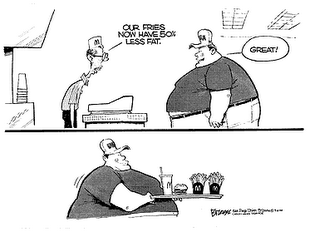JANE E. BRODY:
"Developers in the last half-century called it progress when they built homes and shopping malls far from city centers throughout the country, sounding the death knell for many downtowns. But now an alarmed cadre of public health experts say these expanded metropolitan areas have had a far more serious impact on the people who live there by creating vehicle-dependent environments that foster obesity, poor health, social isolation, excessive stress and depression.
As a result, these experts say, our “built environment” — where we live, work, play and shop — has become a leading cause of disability and death in the 21st century. Physical activity has been disappearing from the lives of young and old, and many communities are virtual “food deserts,” serviced only by convenience stores that stock nutrient-poor prepared foods and drinks.
According to Dr. Richard J. Jackson, professor and chairman of environmental health sciences at the University of California, Los Angeles, unless changes are made soon in the way many of our neighborhoods are constructed, people in the current generation (born since 1980) will be the first in America to live shorter lives than their parents do..."
(The New York Times, January 30, 2012)
I have started seeing ads of "Lay's Baked” range on TV. It claims to have 50% less fat.

Image courtesy: PepsiCo India
Verdict of my son and his friends: They are too expensive. That is too few for their buck.
Claims such as '50%' always bring back to me the following brilliant cartoon of Steve Breen.
This was done following McDonald's slashing the calorie content in their ubiquitous French fries by 50% in the USA.

Speech bubbles read as follows:
"Our fries now have 50% less fat"
"Great!"
Kenneth Rogoff:
Highly processed corn-based food products, with lots of chemical additives, are well known to be a major driver of weight gain, but, from a conventional growth-accounting perspective, they are great stuff. Big agriculture gets paid for growing the corn (often subsidized by the government), and the food processors get paid for adding tons of chemicals to create a habit-forming – and thus irresistible – product. Along the way, scientists get paid for finding just the right mix of salt, sugar, and chemicals to make the latest instant food maximally addictive; advertisers get paid it; and, in the end, the health-care industry makes a fortune treating the disease that inevitably results.
Coronary capitalism is fantastic for the stock market, which includes companies in all of these industries. Highly processed food is also good for jobs, including high-end employment in research, advertising, and health care.
So, who could complain?...
(Feb 1 2012)